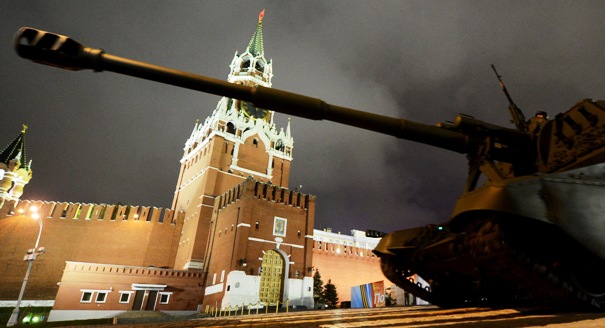The Ukrainian developments are far from over. The crisis in Ukraine will be a lengthy ordeal which will affect Russia’s foreign policy for quite some time. It will also impact the situation inside the country, which is especially important.
Thanks to his active and successful performance on the Ukrainian stage, President Vladimir Putin has elevated his approval ratings to unprecedented heights. According to a March VCIOM (Russian Public Opinion Research Center) poll, Putin would get 64 percent of the vote if elections were to take place today; 93 percent of the respondents support the annexation of Crimea. Having consolidated most of society around himself, Putin looks like a national hero, the “gatherer of Russian lands,” and is now basking in his glory, believing his charisma will never fade.
The Russian president has appropriated nationalist sentiments, turning them entirely against the West, and primarily against the United States, which has again become public enemy number one, just like in the times of the Cold War. Savoring his victory, Putin probably recalls the Cold War years, when the West swallowed the suppression of the 1956 Hungarian uprising and the 1968 occupation of Czechoslovakia. And he definitely remembers the more recent events of 2008, when Washington and Brussels acquiesced to the “independence” of Abkhazia and South Ossetia.
The Kremlin puts a positive spin on the anti-Russian sanctions. The official propaganda constantly stresses that the sanctions actually contribute to the development of the national economy, particularly its hi-tech segment, and improve the domestic financial system. These statements sound appealing to ordinary Russians, who sincerely believe that their country is indeed completely self-sufficient and capable of functioning, and even progressing, in isolation from the rest of the world.
It may seem that Putin has already secured an optimally long reign. The most impressionable of the analysts and authors are starting to compare his rule to the Soviet times, when only leaders’ deaths could pry them away from power.
However, assertions that Putin can now act as he pleases and that his future is all rosy are debatable. First, sooner or later (most likely, later), the sanctions against Russia, if consistent, will start working and will be felt by the Russian public. Then, people will no longer blame the West, but will take their own government to task. Second, the pragmatic economists, including those at the very top, realize that when economy is held hostage to political ambitions the results can never be positive. While there is no split in the Russian political establishment yet, some dissonance can already be heard. As some Russian politicians exalt the financial infusions into Crimea (13 billion rubles in subsidies) and enthusiastically report on pension increases and seaside vacations there, others are calculating the costs of the new acquisition. They remind us of the deplorable state of the economy—economic growth is expected to fall 0.2 percent this year and is unlikely to exceed one percent. (It is clear that Russia will not be able to financially support the Southeastern Ukraine, where some would dream of repeating the Crimean scenario.)
Third, as Russia’s economic outlook turns grimmer, the conflicts within the ruling class will escalate, and one cannot guarantee that Putin will continue in his role of both patron and mediator. His political resource is directly related to economic indicators, primarily the demand for and the price of hydrocarbons, which will keep falling. It is hard to say when this internal power struggle will take place, but it is clearly unavoidable. This struggle will take on a quintessentially Soviet-Byzantine form of backroom intrigue. Just as 50 years ago, Russia and the rest of the world will learn about it from jokes and rumors.
The conflict’s finale is totally unpredictable—it runs the gamut from another perestroika to complete collapse.
No comparison is perfect, but for what it’s worth… Four years separated the Soviet invasion to Afghanistan (1979) and Gorbachev’s ascension to power (1984). The breakup of the Soviet Union occurred 11 years after the invasion (1991). Shall we start counting?





